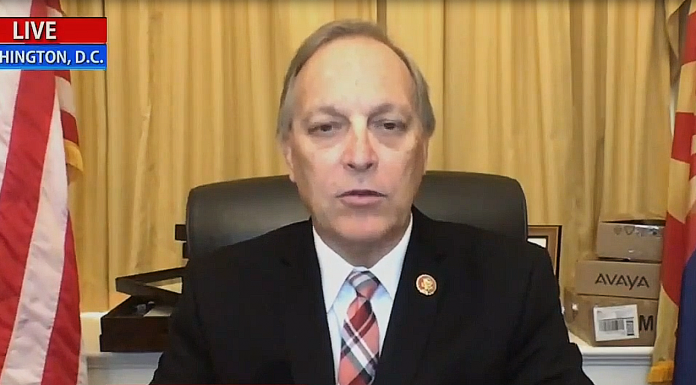Rep. Andy Biggs, R-Ariz., a close ally of President Donald Trump, called out his state’s GOP governor for his overt slap in the face to fellow party members by ignoring evidence of widespread vote fraud.
Arizona Gov. Doug Ducey had pledged previously not to certify election results until the questions over vote fraud issues were resolved.
But instead, he did so at the very time that members of the state legislature were hearing evidence from petitioners, including members of Trump’s legal team.
“In what appears to be a petty move, during a field hearing with witnesses and President Trump’s attorneys presenting evidence to substantiate the questions surrounding the 2020 presidential election, Governor Ducey decided that it was a good look to certify the election,” wrote Biggs in an op-ed Wednesday for Town Hall.
“By doing it at the same time as the hearing, the governor put a finger in the eye of the president and Republicans, almost as if he wanted to distract from the hearing,” Biggs continued. “It was as obvious as a person ignoring a ringing phone, that Governor Ducey was uninterested in the evidence presented by witnesses and the president’s representatives.”
Ducey’s action appeared to validate the baseless claims by leftist media and political operatives that Democrat candidate Joe Biden was the undisputed winner of the election.
Evidence has emerged in six to eight key battleground states indicating that foul play may have been afoot. In addition to Arizona, neighboring Nevada and New Mexico have also been named as potential perpetrators of widespread fraud.
But unlike the other two, Arizona remains under GOP control.
Ducey is widely regarded as a squishy Republican in a state that has seen an influx of blue-state refugees from radical California to the west and illegal immigrants from Mexico to the south.
Likewise, at least two prominent Arizona RINOs—former Sen. Jeff Flake and Cindy McCain, the widow of late Sen. John McCain—both endorsed Biden.
Flake had openly feuded with Trump and had abandoned his re-election hopes in 2018. McCain’s husband also maintained an acrimonious relationship with the president and was a close personal friend of Biden, who offered a eulogy at his funeral.
Nonetheless, Trump appeared poised to claim Arizona for much of election night, even as ballots for Biden continued to pour into areas like the once solid-red Maricopa County.
Fox News also suspiciously called the state for Biden early in the night, when few returns had been reported, despite its having gone for Trump in 2016.
Reports later surfaced that Democrat election officials may have invalidated votes in Republican-heavy precincts by instructing them to use Sharpie markers that bled through the ballots.
During the hearings last week, election-hacking experts also testified that Dominion Voting Systems, which supplied the equipment and software to some 30 states, were in communication with German servers during the tabulation process—although a closed system of connectivity would normally be expected.
Regardless of the compelling evidence that was being presented last week, Ducey insulted fellow Republicans by his refusal to hear it and, subsequently, his symbolic dismissal of its merits.
“When the governor chose to certify Arizona’s election, smack dab in the middle of a hearing where evidence was presented questioning the integrity of the 2020 election, perhaps the governor should have taken the president’s call,” Biggs wrote.
Biggs noted that in the era of Ronald Reagan, party unity had been regarded as one of the most important political principles—much the way Democrats have maintained a monolithic stance on positions regardless of their many competing interests and identity politics.
Nowadays, he lamented, “Republicans, being more independent thinkers than our opponents, often assemble in circular firing squads to the detriment of the greater good.”
But contrary to accusations that his criticism was to blame, Biggs said it was Ducey who stood in violation of Reagan’s “11th Commandment” by breaking rank with the party.
“It indicates pretty strongly that Governor Ducey has left the Reagan Republican Ranch,” Biggs said.
The criticism of Ducey mirrors the higher-profile attacks on Georgia Gov. Brian Kemp, a one-time Trump ally whom the president has sharply criticized for allowing the mishandling of the state elections.
Both governors have refused to exercise their executive power to convene state legislatures to examine more closely the allegations of fraud as deadlines approach for states to appoint their presidential electors.
“The governor [Ducey] would have come off like a champ had he brought the Legislature in for a special session in order to proceed with a full-scale, forensic audit to determine the veracity of the presidential election,” Biggs said.
“First, if the audit proved that the election was pristine and without flaw, it would have substantiated the Governor and other’s claims,” he continued. “… On the flip side, if any flaws, anomalies, or even fraud were discovered the governor would be a champ by rooting out an unjust, untrue election.”
Some have expressed concern that the infighting within the party could do irreparable damage—particularly in Georgia, where two US senators are facing Jan. 5 runoff elections that could flip the balance of the Senate into Democrat control should Republican voters boycott.
But Trump-backers maintain that the greater irreparable damage would be allowing Democrats to get away with an audacious and outrageous attempt to steal the election in plain sight by ignoring the evidence outright.
Such concerns have rung hollow on the Left since March, when Democrat operatives began pushing for more relaxed voter laws under the auspices of the coronavirus pandemic.
While evidence mounted of the impending disaster, they pushed forward—and even gloated about the ensuing turmoil.
“We have put together I think the most extensive and inclusive voter fraud organization in the history of American politics,” Biden inadvertently admitted in October.
View this post on Instagram

